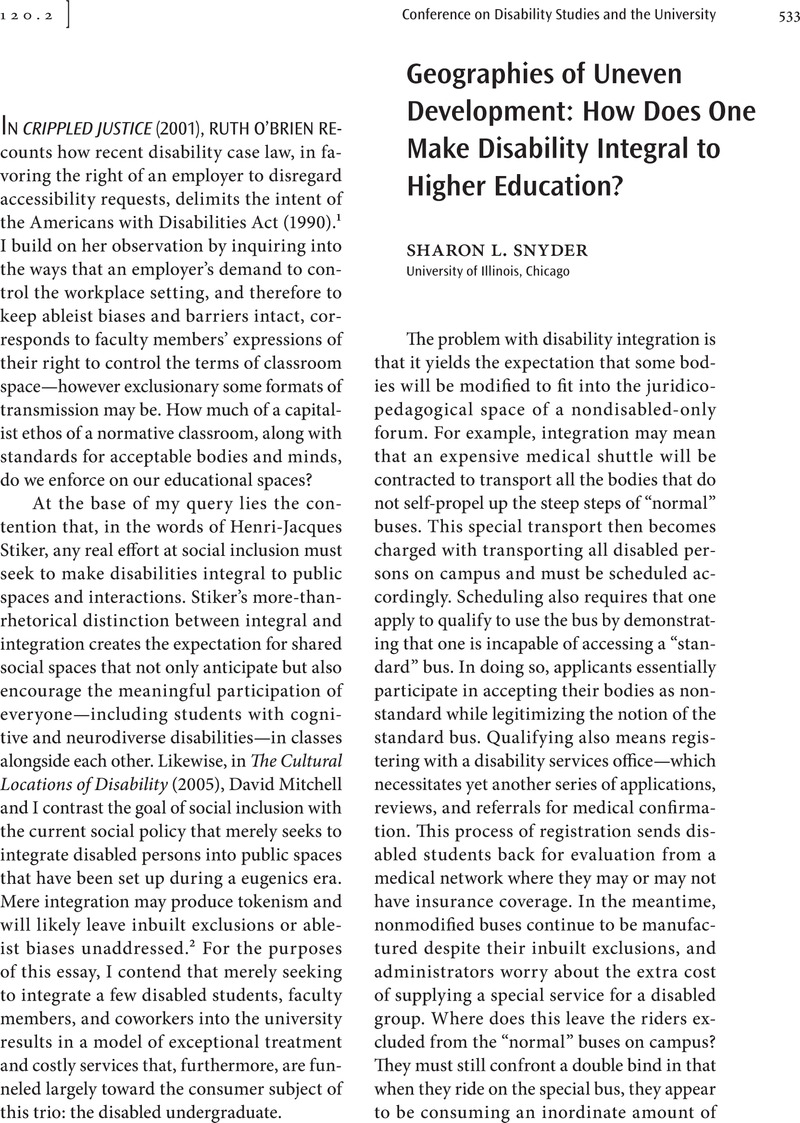No CrossRef data available.
Article contents
Geographies of Uneven Development: How Does One Make Disability Integral to Higher Education?
Published online by Cambridge University Press: 23 October 2020
Abstract
An abstract is not available for this content so a preview has been provided. Please use the Get access link above for information on how to access this content.

Information
- Type
- Conference on Disability Studies and the University
- Information
- Copyright
- Copyright © Modern Language Association of America, 2005
References
Works Cited
Brueggemann, Brenda J. “An Enabling Pedagogy.” Disability Studies: Enabling the Humanities. Ed. Sharon L. Snyder, Brueggemann, and Rosemarie Garland-Thomson. New York: MLA, 2003. 317–36.Google Scholar
Foucault, Michel. The Birth of the Clinic. Trans. A. M. Sheridan Smith. New York: Vintage, 1994.Google Scholar
Halberstam, Judith. “Flexible Politics: Feminism and Transgender Activism.” Back to the Future: Generations of Feminism. Center for Gender Studies, University of Chicago. 28 Feb. 2004.Google Scholar
Kozol, Jonathan. Savage Inequalities: Children in America's Schools. New York: Harper, 1992.Google Scholar
Mitchell, David, and Snyder, Sharon. “Disability and the Double Bind of Representation.” The Body and Physical Difference: Discourses of Disability. Ed. Mitchell and Snyder. Ann Arbor: U of Michigan P, 1997. 1–31.CrossRefGoogle Scholar
Montgomery, Cal. “Critic of the Dawn.” Ragged Edge May 2001. 18 Feb. 2005 <http://www.raggededgemagazine.com/0501/0501cov.htm>..>Google Scholar
O'Brien, Ruth. Crippled Justice: The History of Modern Disability Policy in the Workplace. Chicago: U of Chicago P, 2001.Google Scholar
Ong, Aihwa. Buddha Is Hiding: Refugees, Citizenship, the New America. Berkeley: U of California P, 2003.CrossRefGoogle Scholar
Poe, Janita, and Martinez, Michael. “Agreement Reached on Special Ed Lawsuit.” Chicago Tribune 4 Nov. 1997: 1.Google Scholar
Priestley, M., Corker, M., and Watson, N. “Unfinished Business: Disabled Children and Disability Identity.” Disability Studies Quarterly 19.2 (1999): 87–98.Google Scholar
Priestley, M., Rabiee, P., and Harris, J. “Young Disabled People and the ‘New Arrangements’ for Leaving Care in England and Wales.” Children and Youth Services Review 25 (2003): 863–90.CrossRefGoogle Scholar
Snyder, Sharon, and Mitchell, David. The Cultural Locations of Disability. Chicago: U of Chicago P, forthcoming.Google Scholar
Stiker, Henri-Jacques. A History of Disability. Trans. William Sayers. Ann Arbor: U of Michigan P, 2000.CrossRefGoogle Scholar

